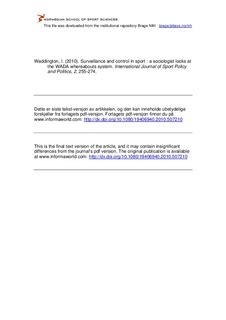| dc.contributor.author | Waddington, Ivan | |
| dc.date.accessioned | 2012-06-28T10:25:33Z | |
| dc.date.available | 2012-06-28T10:25:33Z | |
| dc.date.issued | 2010-11 | |
| dc.identifier | Seksjon for kultur og samfunn / Department of Cultural and Social Studies | |
| dc.identifier.citation | International Journal of Sport Policy and Politics. 2010, 2(3) 255-274 | no_NO |
| dc.identifier.issn | 1940-6959 | |
| dc.identifier.issn | 1940-6940 | |
| dc.identifier.uri | http://hdl.handle.net/11250/170851 | |
| dc.description | I Brage finner du siste tekst-versjon av artikkelen, og den kan inneholde ubetydelige forskjeller fra forlagets pdf-versjon. Forlagets pdf-versjon finner du på www.informaworld.com: http://dx.doi.org/10.1080/19406940.2010.507210 / In Brage you'll find the final text version of the article, and it may contain insignificant differences from the journal's pdf version. The original publication is available at www.informaworld.com: http://dx.doi.org/10.1080/19406940.2010.507210 | no_NO |
| dc.description.abstract | This paper draws upon the sociology of Norbert Elias to examine some central aspects of
the whereabouts system introduced by the World Anti-Doping Agency (WADA) as part
of its anti-doping policies. More specifically, the paper aims to: (1) locate the whereabouts
system within the context of broader social processes, including changing practices
and ideas concerning surveillance and control, personal liberty, privacy and
democracy; (2) examine the impact of the introduction of the whereabouts system on
the relationship between elite athletes andWADA; and (3) examine some of the difficulties
in developing and implementing anti-doping policy. In relation to the latter, it is
suggested that the introduction of the whereabouts policy has had a number of unplanned
consequences which, from WADA’s perspective, will almost certainly be seen as unwelcome:
the alienation of large numbers of athletes, whose cooperation is essential if the
system is to operate smoothly and efficiently; the deteriorating relationship with other
key organizations such as the EU; the emergence of a challenge, led by the European Elite
Athletes Association, to the legitimacy of decision-making processes withinWADA; and
finally, the uneven application of the whereabouts requirements which has led to the
creation of what many athletes see as a new form of unfairness.
Keywords: anti-doping policy; performance-enhancing drugs; WADA | no_NO |
| dc.language.iso | eng | no_NO |
| dc.publisher | Taylor & Francis | no_NO |
| dc.subject | WADA | no_NO |
| dc.subject | anti-doping policy | no_NO |
| dc.subject | performance-enhancing | no_NO |
| dc.subject | drugs | no_NO |
| dc.title | Surveillance and control in sport: a sociologist looks at the WADA whereabouts system | no_NO |
| dc.type | Journal article | no_NO |
| dc.type | Peer reviewed | no_NO |
| dc.subject.nsi | VDP::Social science: 200::Political science and organizational theory: 240 | no_NO |
| dc.source.pagenumber | 255-274 | no_NO |
| dc.source.volume | 2 | no_NO |
| dc.source.journal | International Journal of Sport Policy and Politics | no_NO |
| dc.source.issue | 3 | no_NO |
